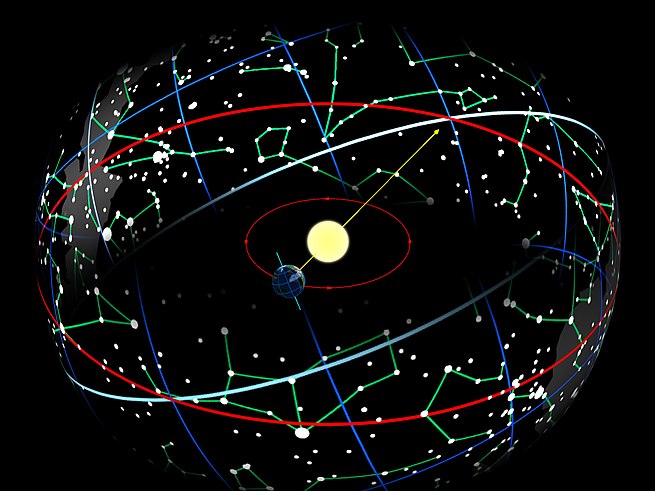Main Difference
The main difference between Zodiac and Horoscope is that the Zodiac is a celestial circle of twelve divisions centered upon the ecliptic and Horoscope is a astrological chart or diagram
-
Zodiac
The zodiac is an area of the sky that extends approximately 8° north or south (as measured in celestial latitude) of the ecliptic, the apparent path of the Sun across the celestial sphere over the course of the year. The paths of the Moon and visible planets are also within the belt of the zodiac.In Western astrology, and formerly astronomy, the zodiac is divided into twelve signs, each occupying 30° of celestial longitude and roughly corresponding to the constellations: Aries, Taurus, Gemini, Cancer, Leo, Virgo, Libra, Scorpio, Sagittarius, Capricorn, Aquarius, and Pisces.These astrological signs form a celestial coordinate system, or even more specifically an ecliptic coordinate system, which takes the ecliptic as the origin of latitude and the Sun’s position at vernal equinox as the origin of longitude.
-
Horoscope
A horoscope is an astrological chart or diagram representing the positions of the Sun, Moon, planets, astrological aspects and sensitive angles at the time of an event, such as the moment of a person’s birth. The word horoscope is derived from the Greek words ōra and scopos meaning “time” and “observer” (horoskopos, pl. horoskopoi, or “marker(s) of the hour”). Other commonly used names for the horoscope in English include natal chart, astrological chart, astro-chart, celestial map, sky-map, star-chart, cosmogram, vitasphere, radical chart, radix, chart wheel or simply chart. It is used as a method of divination regarding events relating to the point in time it represents, and it forms the basis of the horoscopic traditions of astrology.
In common usage, horoscope often refers to an astrologer’s interpretation, usually based on a system of solar Sun sign astrology; based strictly on the position of the Sun at the time of birth, or on the calendar significance of an event, as in Chinese astrology. In particular, many newspapers and magazines carry predictive columns, written in prose that may be written more for increasing readership than tied directly to the Sun or other aspects of the solar system, allegedly based on celestial influences in relation to the zodiacal placement of the Sun on the month of birth, cusp (2 days before or after any particular sign, an overlap), or decant (the month divided into 3 ten-day periods) of the person’s month of birth, identifying the individual’s Sun sign or “star sign” based on the tropical zodiac.In Hindu astrology, birth charts are called Kundali which are very significant and are based on movement of stars and moon. All the auspicious things are started after checking the kundali of a person including the marriage in which the birth charts of the boy and girl are matched.
There are no scientific studies that have shown support for the accuracy of horoscopes, and the methods used to make interpretations are pseudo-scientific. In modern scientific framework no known interaction exists that could be responsible for the transmission of the alleged influence between a person and the position of stars in the sky at the moment of birth. In all tests completed, keeping strict methods to include a control group and proper blinding between experimenters and subjects, horoscopes have shown no effect beyond pure chance. Furthermore, some psychological tests have shown that it is possible to construct personality descriptions and foretelling generic enough to satisfy most members of a large audience simultaneously, referred to as the Forer or Barnum effect.
-
Zodiac (noun)
The belt-like region of the celestial sphere approximately eight degrees north and south of the ecliptic which include the apparent path of the sun, moon, and visible planets.
-
Zodiac (noun)
The twelve equal divisions of the zodiacal region into signs or houses, each named for a prominent constellation in the region.
-
Zodiac (noun)
The ecliptic: the belt-like region of the celestial sphere corresponding to the apparent path of the sun over the course of a year.
-
Zodiac (noun)
Any of various astrological systems considered similar to the above.
-
Zodiac (noun)
A circle decorated with the signs of the zodiac.
-
Horoscope (noun)
The position of the planets and stars at the moment of someone’s birth; a diagram of such positions.
-
Horoscope (noun)
An astrological forecast of a person’s future based on such information.

